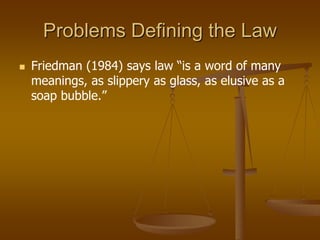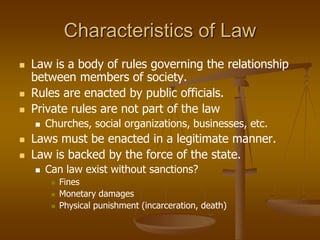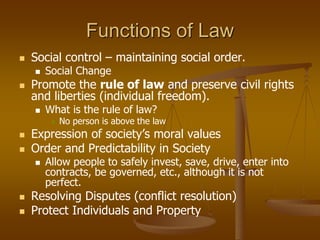What is law
- 1. What is law? Issues in Judicial Politics
- 2. What is law? Jurisprudence – the study of legal philosophy. Questions: What is law? Is bad law, law? Is custom law? Are norms law? How is law connected with morality?
- 3. Definitions of Law Herbert Jacob: “Authoritative rules made by government…intended to bind government itself, people and institutions outside government, or both.” Henry Abraham: “Law is the rules of conduct that pertain to a given political order of society; rules that are backed by organized force of the community.” Benjamin Cardozo and Oliver Wendell Holmes, Jr.: Law is “a principle or rule of conduct so established as to justify a prediction with reasonable certainty that it will be enforced by courts of its authority if challenged.” “…the prophecies of what the courts will do in fact, and nothing more pretentious, are what I mean by law.” Procedural due process. Weber: “An order will be called law if it is externally guaranteed by the probability that coercion (physical or psychological), to bring about conformity or avenge violation, will be applied by a staff of people holding themselves ready for that purpose.” Lief Carter: “Law is the legal process lawyers and judges use when they try to prevent or resolve human problems using rules made by the state as their starting point.”
- 4. Norms, Folkways, More, Customs, and Law Rules (the entire universe of social control mechanisms) Legal Rules (laws) Norms Informal Norms Folkways Mores Formal Norms Formal governmental norms are called laws. Customs and Tradition?
- 5. Problems Defining the Law Friedman (1984) says law “is a word of many meanings, as slippery as glass, as elusive as a soap bubble.”
- 6. Characteristics of Law Law is a body of rules governing the relationship between members of society. Rules are enacted by public officials. Private rules are not part of the law Churches, social organizations, businesses, etc. Laws must be enacted in a legitimate manner. Law is backed by the force of the state. Can law exist without sanctions? Fines Monetary damages Physical punishment (incarceration, death)
- 7. Functions of Law Social control – maintaining social order. Social Change Promote the rule of law and preserve civil rights and liberties (individual freedom). What is the rule of law? No person is above the law Expression of society’s moral values Order and Predictability in Society Allow people to safely invest, save, drive, enter into contracts, be governed, etc., although it is not perfect. Resolving Disputes (conflict resolution) Protect Individuals and Property






